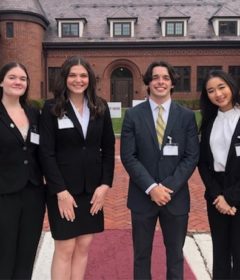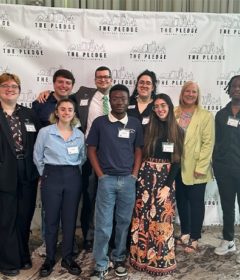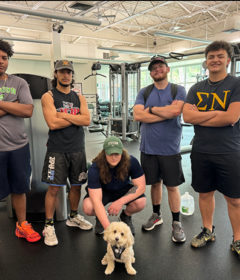Teaching English for Social Justice
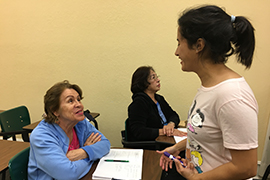
Julieta Almeida left Venezuela recently to stay with her family in DeLand and she worried if she could learn to speak English here.

But Almeida, 80, found a welcoming environment at Stetson University’s La Casa Cultural Latina, or “the Latino Cultural House,” where Stetson faculty and students help people learn English as a second language.
During a recent class, Almeida practiced basic greetings in English with Stetson student Valeria Servigna, a volunteer tutor through the university’s Bonner Program.
“It’s a lot better than a college class because it’s free and, in other classes, they will speak purely English to you, but here they speak to you in English and Spanish, which is great and helps me understand,” Almeida said in Spanish, as Stetson sophomore and La Casa volunteer Mimi Nival translated to English.
La Casa has taught English classes to Latinos in the community for the past three years and was started by Assistant Professor Pamela Cappas-Toro, Ph.D., in Stetson’s World Languages and Cultures Department.
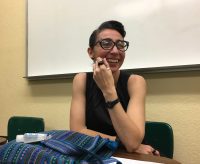
“I see language acquisition as a social justice issue,” said Cappas-Toro, who was born and raised in Puerto Rico. “A lot of the people who don’t know much English, they cannot go to governmental agencies for services. They can get misdiagnosed when they go to the doctor. There are a lot of barriers that people have. Parents cannot help their kids. It creates a network of disadvantage for the whole family — not only for the person who doesn’t know the language, but for the family members as well.”
AN ‘EYE-OPENING’ EXPERIENCE
La Casa Cultural Latina operates out of a small two-story brick house behind the Gillespie Museum at 234 E. Michigan Ave., and uses classrooms in Sampson Hall to teach English. Latinos, ages 4 to 82, attend classes two nights a week during the academic year, and also participate in cultural activities, such as monthly Tertulias, or get-togethers, for conversation and food.
Stetson students help during the classes as part of their coursework in Cappas-Toro’s Spanish 313: Spanish in Communities course. And several Stetson students volunteer as tutors through the Bonner Program, which provides financial aid to students in exchange for community service.
Mimi Nival, a Stetson marketing major from Ocala, learned about La Casa when she was taking another Spanish class and she asked to volunteer, starting this semester. She already is planning to return in August when La Casa classes resume during the fall semester.
“They really appreciate the fact that we do this for them,” said Nival, who grew up in Massachusetts in a family of Puerto Rican descent. “When I started with La Casa Cultural and heard the stories of the students from Venezuela, their struggles and how they came here for a better life, it’s very eye-opening. It makes you realize you take your citizenship for granted here.”
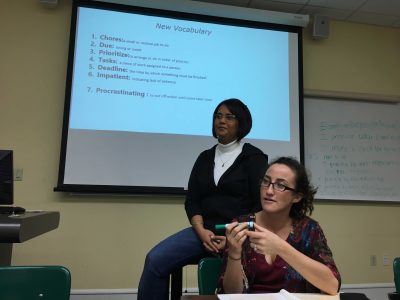
The center has hired an ESL instructor, Maria Servigna, who also works as an adjunct professor of Spanish in the World Languages department. Cappas-Toro said the center receives funding from the Sarah George Trust Fund and the dean of Stetson’s College of Arts and Sciences, Karen Ryan, Ph.D., although it operates on a shoestring budget.
For Maria Servigna, La Casa is a family affair. Her mother, Emelva Acosta, recently came from Venezuela and takes English classes there. And Servigna’s niece, Stetson student Valeria Servigna, is a volunteer tutor through the Bonner Program. Valeria Servigna also will serve as a translator during Stetson’s Commencement Ceremony on Saturday, May 13, for a Spanish-speaking family of one graduate.
Professor Cappas-Toro said La Casa provides a learning experience not only for Latinos in the community, but also for Stetson students. The class allows Stetson students to interact with others who may have come from underprivileged backgrounds and also raises their awareness about the prejudices that Spanish speakers can face in America.
“I’m a Spanish instructor, so I know on a daily basis the stigmas that people have about Spanish speakers and people who come from Latin America,” Cappas-Toro said. “Language is a big issue in the United States. Part of La Casa is promoting a good, positive image about Spanish. It’s not like you have to totally eradicate your Spanish and just speak English. No, you can have both languages and also you have to embrace the Spanish language.”
LIVING SOCIAL JUSTICE ON A DAILY BASIS
Cappas-Toro joined the Stetson faculty in 2013 and brought the idea of La Casa Cultural Latina with her from the University of Illinois at Urbana-Champaign, where she received her Ph.D. in Spanish and was involved with La Casa Cultural Latina there.
Once at Stetson, she worked with Stetson Professor Robert Sitler, director of the Latin American Studies Program, to develop a similar program here that would attract a diverse mix of Latino cultures – people from Ecuador to the Dominican Republic to Mexico. Her passion for community outreach began, she said, as a child growing up in Puerto Rico. Her father was a police officer who ran the police athletic league for children for 15 years.
“I come from an underprivileged background. Cops in Puerto Rico don’t make a lot of money,” she explained.
Her father coached soccer, track and field, and boxing, and ran summer camps with 300 kids and very little funding. Many of these economically disadvantaged children, including Cappas-Toro, attended college on athletic scholarships — for her, in track and field — based on their involvement in these sports teams.
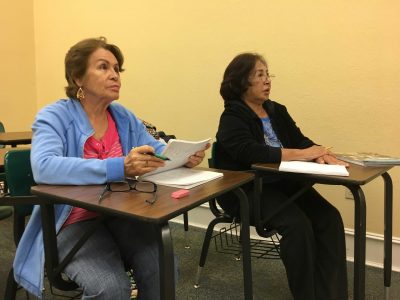
“I remember sometimes my father bringing 20 kids to my house and my mom would say, ‘I have to cook for all these kids now?’” recalled Cappas-Toro with a laugh. “It was not about just me and my brother, but having an impact through sports and using sports as a way for kids to find scholarships through this program that my dad put together.”
She received a bachelor’s degree in physical education and coaching from the University of Puerto Rico. After graduation, she was working as a waitress making $2.15 an hour and decided to enlist in the U.S. Army as a Spanish linguist. She earned a master’s degree in Spanish while stationed in San Antonio, Texas, and then went on to get her doctorate at the University of Illinois.
“Community work is important,” she said. “I never studied anything about social justice, but I’ve lived it on a daily basis because I saw the impact of having free services for the community, especially for poor communities.
“If my father hadn’t reached out to so many people, I might not have reached out to so many people,” she said. “But with the skills I have as an educator, I need to get out of my office. I come from a poor background, so I would feel very bad about just living a comfortable life now that I have a Ph.D. and I have another socio-economic status. I feel that would be very wrong.“
-Cory Lancaster

